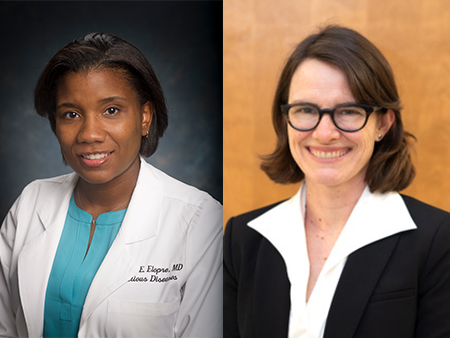 Latesha Elopre, M.D., and Lynn Matthews, M.D.Researchers in the University of Alabama at Birmingham Center for AIDS Research received three one-year supplemental awards totaling $300,000 from the National Institutes of Health. UAB CFAR will use the awards to help develop plans for diagnosing, treating and preventing HIV in local communities, many of which are areas with high rates of new cases.
Latesha Elopre, M.D., and Lynn Matthews, M.D.Researchers in the University of Alabama at Birmingham Center for AIDS Research received three one-year supplemental awards totaling $300,000 from the National Institutes of Health. UAB CFAR will use the awards to help develop plans for diagnosing, treating and preventing HIV in local communities, many of which are areas with high rates of new cases.
With these gifts, UAB’s CFAR and researchers will help carry out the Ending the HIV Epidemic agenda set by the Trump administration to diagnose, treat and prevent HIV.
Grants and the topics/areas they will cover include:
- Lynn Matthews, M.D.:
- Using big data to estimate undiagnosed HIV infection and inform testing interventions in Alabama
- Promoting PrEP use among African American adolescent girls and young women at risk for HIV in the Deep South: provider and client perspectives
- Latesha Elopre, M.D.:
- PrOTECT AL: PrEP optimization through enhanced capture of treatment
“As a part of the national Ending the HIV Epidemic plan, these projects directly align with strategic pillars and occur in places and with people who are disparately impacted by the epidemic [of HIV],” Elopre explained. “The state of Alabama has been identified as a hot spot within our national plan due to our HIV rural epidemic, where often increased poverty and lack of health care infrastructure are major barriers to HIV prevention and care. UAB is uniquely positioned in the state as a collaborator that truly understands the contextual factors that are shaping our local HIV epidemic. That knowledge allows us to form meaningful partnerships with front-line advocates and HIV prevention providers in the community.”
Through this work, UAB is among 16 other CFAR institutions nationwide participating in this aggressive plan of action. UAB’s CFAR and researchers will partner with community groups and health officials to develop targeted plans for treating HIV in Birmingham and Alabama at large.
“In each of these projects, community partnerships are key to answering the questions posed. UAB is invested in bringing together researchers and community to ask relevant questions, interpret the findings, and apply what we learn to improving the health of people affected by HIV in Alabama,” Matthews said. “I am thrilled to join these teams of researchers and community partners to work together to understand how to improve HIV prevention and care in Alabama.”
The awardees and community implementation partners will attend the Implementation Science Coordination, Consultation and Collaboration Initiative later this year to undergo implementation science training, consultation and onboarding for the project teams.